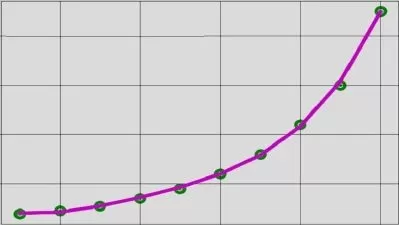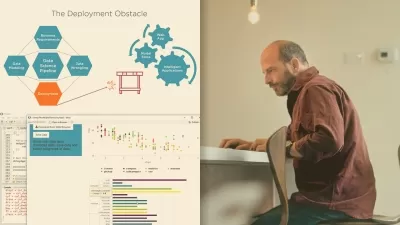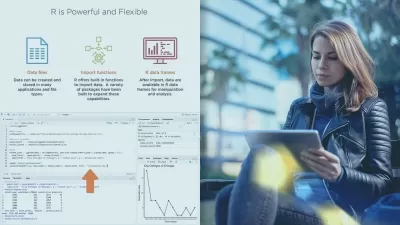Logistic Regression & Supervised Machine Learning with R
EDUCBA Bridging the Gap
3:50:49
Description
Learn with case studies on Advertisement Dataset, Diabetes Dataset, Credit Risk using Logistic Regression in R Studio
What You'll Learn?
- Know in detail about logistic regression analysis and its benefits
- Know about the different methods of finding the probabilities and Understand about the key components of logistic regression
- Learn how to interpret the modeling results and present it to others
- Know how to interpret logistic regression analysis output produced by R
Who is this for?
What You Need to Know?
More details
DescriptionWe are starting this course with a case study. So, learn practically. Learn with case studies on Advertisement Dataset, Diabetes Dataset, Credit Risk using Logistic Regression in R Studio.
Regression is a statistical method which helps to determine the relationship between one dependent variable and other independent variables. It explains how the dependent variable changes when one of the independent variable varies. It is also used to know which independent variable is related to the dependent variable and what is their relationship. Regression analysis is widely used in the field of prediction and forecasting. Regression analysis is an important component for modelling and analyzing data.
Regression is of two types - Linear regression and Multiple regression. Linear regression uses one independent variable to know the outcome whereas Multiple regression uses two or more independent variable to forecast the output.
In the recent years many techniques have been developed to perform regression analysis. They are Linear regression, Logistic regression, Polynomial regression, Stepwise regression, Ridge regression, Lasso Regression and Elastic net regression.
Uses of regression analysis
Regression analysis helps to find the significant relationship between dependent variable and independent variable
It helps to know the amount of impact caused by multiple independent variables on a dependent variable
It helps to compare the effects of variables measured using different scales. This comparison will help to bring out the best to be used for predictive modelling.
Regression analysis is used in businesses for a lot of reasons like to find out the factors responsible for business profit, to forecast the future value, to know how the interest rates can affect the stock price and so on.
Regression analysis is used as a quantitative research method which is used when the research involves modelling and analysis of several variables.
Logistic regression in R is defined as the binary classification problem in the field of statistic measuring. The difference between a dependent and independent variable with the guide of logistic function by estimating the different occurrence of the probabilities, i.e., it is used to predict the outcome of the independent variable (1 or 0 either yes/no) as it is an extension of a linear regression which is used to predict the continuous output variables.
How does Logistic Regression in R works?
Logistic regression is a technique used in the field of statistics measuring the difference between a dependent and independent variable with the guide of logistic function by estimating the different occurrence of probabilities. They can be either binomial (has yes or No outcome) or multinomial (Fair vs poor very poor). The probability values lie between 0 and 1, and the variable should be positive (
It targets the dependent variable and has the following steps to follow:
n- no. of fixed trials on a taken dataset.
With two outcomes trial.
The outcome of the probability should be independent of each other.
The probability of success and failures must be the same at each trial.
Who this course is for:
- Anyone who is interested in modeling data and estimate the probabilities of given outcomes.
We are starting this course with a case study. So, learn practically. Learn with case studies on Advertisement Dataset, Diabetes Dataset, Credit Risk using Logistic Regression in R Studio.
Regression is a statistical method which helps to determine the relationship between one dependent variable and other independent variables. It explains how the dependent variable changes when one of the independent variable varies. It is also used to know which independent variable is related to the dependent variable and what is their relationship. Regression analysis is widely used in the field of prediction and forecasting. Regression analysis is an important component for modelling and analyzing data.
Regression is of two types - Linear regression and Multiple regression. Linear regression uses one independent variable to know the outcome whereas Multiple regression uses two or more independent variable to forecast the output.
In the recent years many techniques have been developed to perform regression analysis. They are Linear regression, Logistic regression, Polynomial regression, Stepwise regression, Ridge regression, Lasso Regression and Elastic net regression.
Uses of regression analysis
Regression analysis helps to find the significant relationship between dependent variable and independent variable
It helps to know the amount of impact caused by multiple independent variables on a dependent variable
It helps to compare the effects of variables measured using different scales. This comparison will help to bring out the best to be used for predictive modelling.
Regression analysis is used in businesses for a lot of reasons like to find out the factors responsible for business profit, to forecast the future value, to know how the interest rates can affect the stock price and so on.
Regression analysis is used as a quantitative research method which is used when the research involves modelling and analysis of several variables.
Logistic regression in R is defined as the binary classification problem in the field of statistic measuring. The difference between a dependent and independent variable with the guide of logistic function by estimating the different occurrence of the probabilities, i.e., it is used to predict the outcome of the independent variable (1 or 0 either yes/no) as it is an extension of a linear regression which is used to predict the continuous output variables.
How does Logistic Regression in R works?
Logistic regression is a technique used in the field of statistics measuring the difference between a dependent and independent variable with the guide of logistic function by estimating the different occurrence of probabilities. They can be either binomial (has yes or No outcome) or multinomial (Fair vs poor very poor). The probability values lie between 0 and 1, and the variable should be positive (
It targets the dependent variable and has the following steps to follow:
n- no. of fixed trials on a taken dataset.
With two outcomes trial.
The outcome of the probability should be independent of each other.
The probability of success and failures must be the same at each trial.
Who this course is for:
- Anyone who is interested in modeling data and estimate the probabilities of given outcomes.
User Reviews
Rating
EDUCBA Bridging the Gap
Instructor's Courses
Udemy
View courses Udemy- language english
- Training sessions 27
- duration 3:50:49
- Release Date 2024/01/05






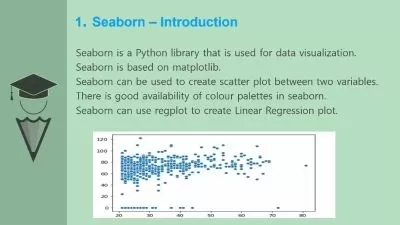


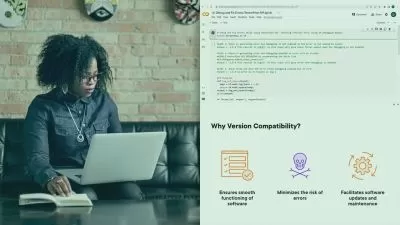

![Master Regression & Prediction with Pandas and Python [2024]](https://traininghub.ir/image/course_pic/38374-x225.webp)



